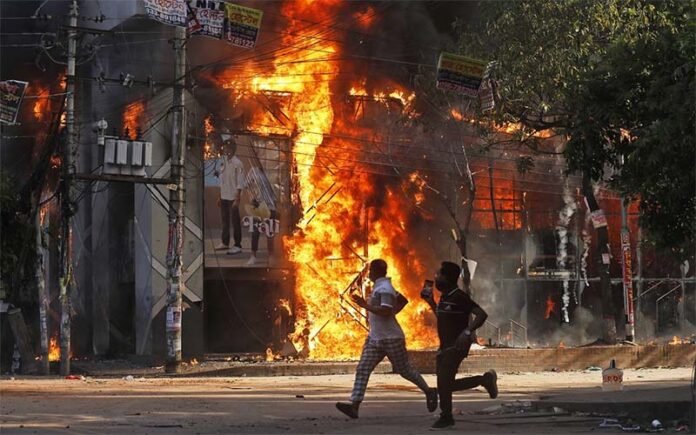Secularism, a Western import essentially means the state to be irreligious or in the French sense of laicite – to be strictly irreligious. It was an invention of the Italian diplomat and philosopher Niccolo Machiavelli; over the years the idea as an instrument of a state’s social policies has evolved across societies. The idea has been widely adopted in the constitutions of various countries, including India. The oriental concept (read Indic) of secularism asserts that the state shall remain equidistant on the one hand and take positive steps to respect, revere, and promote all religions equally. But what happens when the very idea of secularism is taken for granted – take the example of Bangladesh?
The overthrow of the erstwhile Sheikh Hasina government on August 5 of this year in the so-called student demonstrations was supposed to herald a revolutionary moment in the political history of South Asia; instead, it descended into chaos and upheaval.
The secular fabric of Bangladesh, which was on full display for almost all of its existence, disappeared for all practical purposes. Today, the idea of Sheikh Mujibur Rahman’s Bangladesh — the country that was supposed to be the beacon of linguistic nationalism on the global scene without discriminating against any individual based on their religious identity — is a figment of imagination.
Religious minorities in Bangladesh are in extreme danger. Of them, Hindus comprising only 9% of the country’s population down from 27% at the time of the Liberation War have been relegated to the status of eighth-class citizens. Islamic religious fundamentalists are routinely destroying their homes based on their identity, desecrating Hindu places of worship, kidnapping and raping Hindu and Buddhist women, looting their places of occupation, and committing other horrendous atrocities.
Religious minorities in Bangladesh are in extreme danger. Hindus are being attacked, their homes destroyed, places of worship desecrated and women raped by Islamic fundamentalists
Naturally, serious concerns have been expressed by India, the civilisational abode of Sanatana Dharma. But the Bangladesh interim government led by Muhammad Yunus is paying only lip service to the concerns of New Delhi in general and the international community in particular.
In this context, New Delhi must weigh options to rescue the beleaguered minorities of the country.
Humanitarian Intervention
History is replete with incidents where countries have either acted alone or joined forces with others to intervene in other countries. For instance, the Nazis offered air support to the Fascist regime of General Francisco Franco in Spain during the Spanish civil war of 1936.
However, with the end of the Cold War and the onset of globalisation, intervention in the internal affairs of a country on the one hand and violating the external sovereignty of a country has acquired a humanitarian dimension. There have been widespread instances of the West intervening in Congo, Rwanda, and Serbia during the Yugoslavian civil war. To provide a proper legal framework to allow countries to uphold international law while intervening, the International Commission for State Intervention and State Sovereignty (ICISS), appointed by the Government of Canada in 2001, formulated a framework known as R2P or Responsibility to Protect doctrine. Under this doctrine, governments of all countries have the legal and moral responsibility to protect their civilian populations. In the event of their failure to protect the populace, foreign countries have the right to intervene to protect the civilian population to avert four kinds of crimes:
- Genocide
- War crimes
- Crimes against humanity
- Ethnic cleansing
Further, it established detailed guidelines highlighting the standard operating procedure (SOP) and the steps countries must take to satisfy these criteria to meaningfully intervene.
History is replete with incidents where countries have intervened in other countries. The Nazis offered air support to the Fascist regime in Spain during the Spanish civil war of 1936
The recommendations of the ICISS were adopted by the United Nations at the 2005 World Outcome Summit 2005 vide resolution A/RES/60/1, thereby officially earning its place under international law.
Given such an international legal provision, India must weigh exercising this option. The atrocities against Hindus ranging from kidnapping of women to arresting innocent people is only a prelude to the commencement of the fourth provision of this legal document – ethnic cleansing.
India has been a witness to the genocide against Kashmiri Pandits in the 1990s, the world has been a witness to the genocide of Bosnian Muslims during the Yugoslavian civil war of 1990, and India cannot afford to see another ethnic cleansing rather along its eastern borders.
Delhi should approach the UN for expeditious punitive action against the Bangladesh government, if it fails, India must send its military under the R2P framework to protect minorities
New Delhi has never interfered in the internal affairs of other countries. However, when the ‘children of Mother India’ are suffering thanks to religious fundamentalists India must take all measures, despite breaking years of tradition to protect its people. India must approach the UN demanding that it either take expeditious punitive action against the government of Bangladesh to arrest the atrocities against religious minorities or if it fails, India will be forced to invoke the provision of humanitarian intervention under the R2P framework and send its military to Bangladesh to protect Hindus and other religious minorities.
–The writer is currently working as a Research Associate at Defence Research and Studies (dras.in) and is a columnist. The views expressed are personal and do not necessarily reflect the views of Raksha Anirveda






